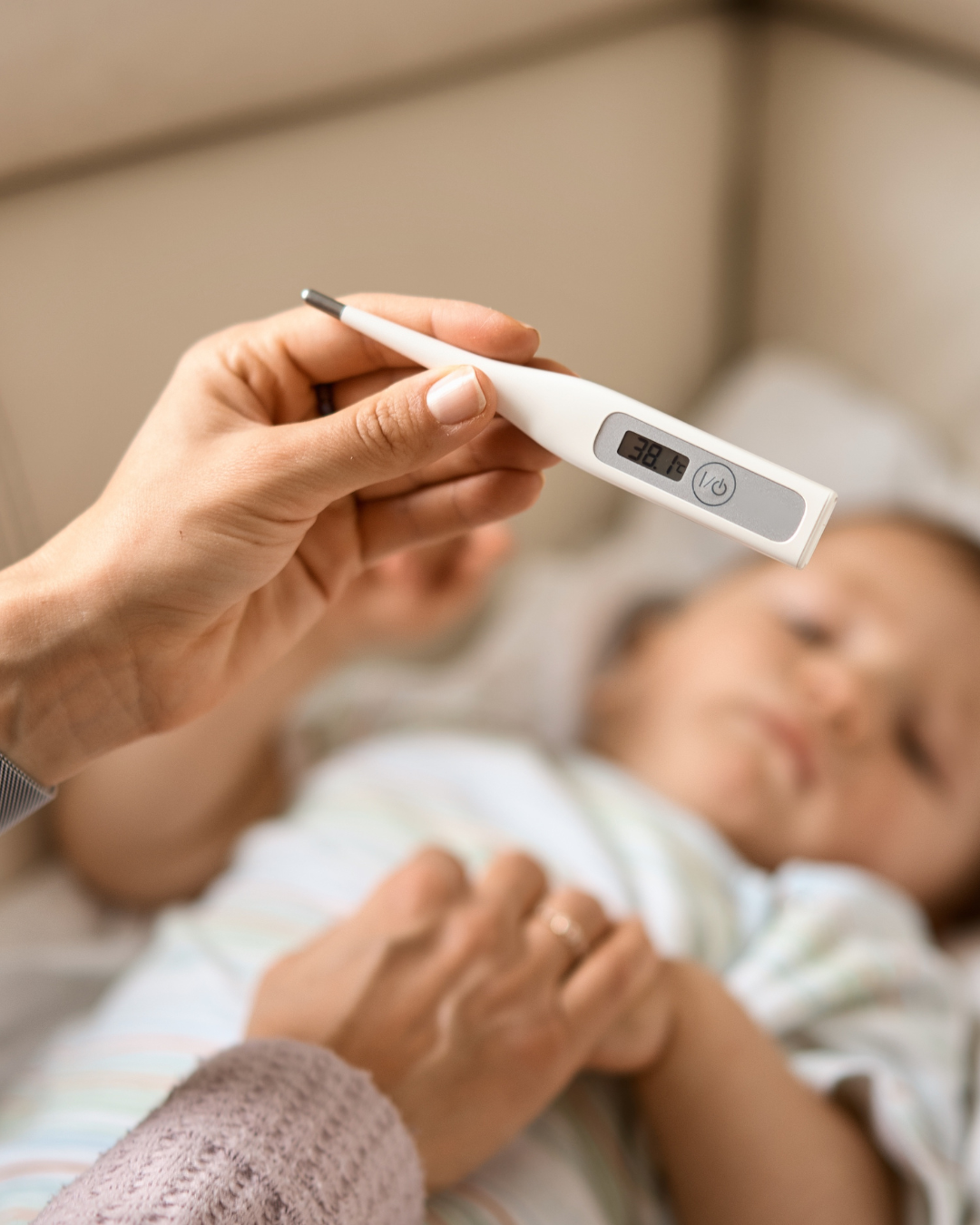RSV: symptoms, causes and treatment



As the weather turns colder, you may start hearing more about RSV, a virus that can spread quickly among babies and young children, often more so in the winter months. While it’s very common and often mild, RSV can occasionally cause breathing difficulties in infants, so it’s important for parents to understand what to look out for and how to help keep little ones healthy.
RSV (respiratory syncytial virus) is a common virus that affects the lungs and airways. Most children catch RSV before the age of two. In many cases, it causes nothing more than a cold, but in some cases – it can lead to bronchiolitis, an inflammation of the small airways that makes breathing more difficult. This can be particularly worrying for those under one, born prematurely, or with existing heart or lung conditions,
Although RSV can sound worrying, the vast majority of babies recover fully with rest, fluids, and supportive care at home. The key is knowing when to watch and when to seek help.
“Bronchiolitis is a common winter illness in babies and young children, most often caused by a virus called RSV. While it can sometimes lead to severe breathing difficulties, most cases are mild, self-limiting, and respond well to supportive care. Parents of newborns should be aware of this winter illness so they can recognise symptoms early and seek help when needed.” – Dr Krishna Jada.
RSV symptoms can look a lot like a cold at first. Early signs may include:
As the illness progresses, some babies develop bronchiolitis, which can cause:
If your baby is struggling to breathe, feeding less than half their normal amount, or seems unusually sleepy or pale, it’s important to seek medical advice promptly.
Some parents notice a mild RSV rash during or after infection. This is usually caused by the body’s immune response rather than the virus itself. The rash is often harmless and short-lived, but if it’s widespread, persistent, or accompanied by other symptoms such as fever or swelling, it’s best to get your baby checked by a doctor.
RSV and flu (influenza) can both cause cold-like symptoms in children, but there are a few key differences:
| RSV | Flu |
| Often starts gradually | Usually comes on suddenly |
| Causes cough, congestion, and wheezing | Causes high fever, aches, chills, and fatigue |
| More likely to affect breathing | More likely to cause body aches and tiredness |
While most cases of RSV and flu can be managed at home, both can occasionally lead to complications in younger children. If you’re unsure which your child has, or if they’re struggling to breathe or feed, it’s always safest to get them checked.
How long does RSV last in an infant?
Most infants with RSV start to feel better after about a week, although mild coughs or congestion can last for up to two weeks. Babies recovering from bronchiolitis may take a little longer to return to their usual feeding and sleep patterns, especially if they had difficulty breathing during the illness.
Symptoms tend to be at their worst around day 5.
RSV spreads easily through droplets from coughing and sneezing, and by touching contaminated surfaces like toys or doorknobs.
Babies and children are most contagious for the first 3–8 days, but some can continue to spread the virus for up to two weeks, especially younger infants or those with weaker immune systems.
Good hygiene can make a big difference:
You can’t always prevent RSV, but a few simple steps can help reduce your baby’s risk:
💜 Wash hands frequently, especially before handling your baby.
💜 Avoid close contact with anyone who has cold-like symptoms.
💜 Clean shared toys, dummies, and surfaces regularly.
💜 Politely ask visitors not to kiss your newborn or young baby during the winter months.
💜 Keep your baby away from smoky environments, as smoke irritates their airways.
💜 Avoid crowded indoor places when possible during peak season.
💜 If your baby was premature or has an underlying condition, speak with your GP or paediatrician about extra precautions – some babies may be eligible for RSV antibody protection.
These small, everyday measures can go a long way in helping to protect vulnerable babies from infection.
Most cases of RSV in babies can be managed at home with supportive care. Here’s what you can do:
RSV is caused by a virus, so antibiotics won’t help, but your paediatrician can advise on ways to relieve discomfort and monitor recovery.
In some cases, babies may need hospital treatment, usually for oxygen support or fluids if feeding is difficult.
Trust your instincts – you know your baby best.
You should contact your GP or paediatrician if your baby:
Go to A&E or call 999 if:
At Kidswell Health, our Paediatric GPs and Paediatricians can assess your baby’s breathing and hydration, offer guidance, and provide the care your family needs for peace of mind this winter.
At Kidswell Health, our experienced team of Paediatric GPs, Paediatricians support babies and children through every stage of development, including common winter illnesses like RSV and bronchiolitis.
If you’re worried about your baby’s breathing, feeding, or recovery, our doctors can assess them quickly and provide clear, expert advice.
Book an appointment online or call 020-3011-1843 to speak with our team.
How long does RSV last in an infant?
Most recover in 7–10 days, though coughs can last up to two weeks.
How long are you contagious with RSV?
Usually 3-8 days, but some infants can spread the virus for up to two weeks.
Is RSV the same as bronchiolitis?
RSV is the virus, bronchiolitis is a condition RSV can cause in babies.
Can RSV cause a rash?
Yes, sometimes a mild rash appears due to the immune response, but it’s usually harmless.

Dr Krishna is a dedicated and compassionate consultant paediatrician with over 12 years of experience caring for children and supporting families through every stage of childhood.
When a child is finding emotions, behaviour, learning or relationships difficult, parents often come across many different professional titles and…
Learn the symptoms, causes and treatment of RSV in babies, plus expert advice on how to protect your child this…
By Debra Silver, Paediatric Physiotherapist at Kidswell Health Watching your baby reach new milestones is one of the most exciting…
Learn about positional talipes in newborns and babies: causes, treatment, recovery time, and how physiotherapy at Kidswell Health can help.
Dr Mitsu Shah explains common side effects of baby vaccinations.
Dr Mitsu Shah shares expert tips to prepare for your baby’s first vaccination.